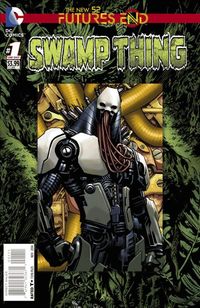Since rebooting their entire lineup of books with brand new first issues back in September 2011 DC Comics has taken to celebrating the anniversary of the New 52 with what has largely proven to be an exercise in diminishing returns.
September 2012 was Zero Month, in which all of DC’s titles got an issue #0 that explored characters’ backgrounds in the reboot’s new continuity. With minimal interruption to ongoing narratives, as more often than not the #0s at least thematically tied into the goings-on of DC’s books, and the preservation of regular creative teams Zero Month brought with it some considerable highlights. The newest Green Lantern of Earth, Simon Baz, the first mention of Batman’s Zero Year and the debut of Shazam in the New 52 all took place in Zero Month.
September 2013, last years’ Villains Month, proved far less suave and far more intrusive. The month saw few creative teams remain intact and nearly every book’s plot was clumsily interrupted by inferior stories featuring DC’s most infamous villains.
This past month DC Comics has celebrated the third anniversary of the New 52 by flashing its books forward 5 years into a possible future that ties into the weekly Futures End series.
I think?
Or are they all just sort of else-worlds, what-if stories?
It doesn’t really matter because, as with all trips into the future, whatever’s going on in the undoubtedly dystopian years to come in Futures End will more than likely wind up reset at the story’s conclusion.
Which isn’t necessarily a bad thing.
Sure the reset button is frustratingly over-utilized but it allows creators an opportunity to really shatter the status quo and do exciting things to characters who rarely change over decades-long lifespans.
The only problem is the Futures End series this month’s books presumably tie into is still six months from hitting that reset button. Which means that rather than truly giving creators the freedom to explore a wide-open future without consequences and run wild with their imaginations, DC really just traded in the status quo of the New 52 with the status quo of Futures End, which, considering by all accounts the weekly series is an average book at best, is necessarily a problem.
My financial participation in Futures End Month was drastically quelled by my experiences with last year’s Villains Month. Of the 40 or so Futures End Month titles published I read around a dozen. So take my rant with a grain of salt if you must, but know in your heart that I know what I’m talking about.
There were certainly highlights amongst the bunch. Much like last year’s Villains Month writer Charles Soule proved himself a superstar, his fantastical Swamp Thing: Futures End #1 undoubtedly the best issue of the month. Ray Fawkes also wrote an entertaining issue of Batman that if nothing else tied in at least thematically with the will-they-won’t-they bromantic chemistry being explored between Batman and Lex Luthor in Justice League.
But most of the material I read from DC this last month wasn’t great or terrible. It fell into that void in between the two: filler.
I got excited reading comic books this past month. Image Comics’ Outcast has finally hooked me and Marvel’s various Spider-Verse tie-ins have all been fun as hell. But I found myself slogging through most of the DC books I bought. The two non-Futures End titles released from DC this month, delayed installments of Justice League and Superman Unchained, shone bright like beacons amongst the novelty 3D covers of Futures End.
Good writers put their names on books far beneath their stature this past month, and I can’t help but suspect the arguable cash grab of this yearly initiative is more than partly to blame.
The New 52’s strength lies in its individual titles and their creative teams: Scott Snyder and Greg Capullo’s Batman, Brian Azzarello and Cliff Chiang’s Wonder Woman, Greg Pak and Aaron Kuder’s Action Comics. DC has concocted creative partnerships that would give the dynamic duo themselves a run for their money. But their last two novelty months have ignored that strength entirely, instead using events like Futures End or Forever Evil to hold otherwise awesome books hostage.
Hopefully next years’ September undertaking won’t sacrifice good books for flash in the pan publishing tricks. If not, I thank DC regardless, because they’ll either do away with weak interruptive themes and let good titles do their thing or they’ll wade neck deep into another silly theme and I’ll save my money for a month… says the guy who will probably fall for DC’s nonsense all over again next September.


